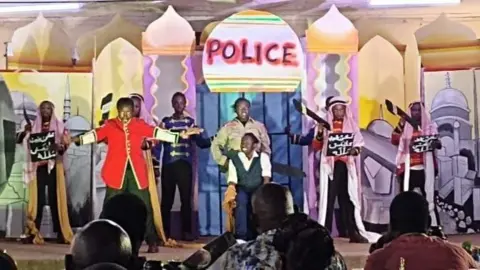Kenya police fire tear gas during school drama competition
 BBC
BBCKenya's national high-school drama competition has been overshadowed by drama of its own after police fired tear gas to disperse a crowd that had gathered to watch a controversial play.
Echoes of War is set in a fictional kingdom where the youth have lost faith in their leaders.
It features battles with the police and has drawn parallels with last year's protests by young people against tax rises.
It was initially disqualified from the drama festival under unclear circumstances, but a High Court ruling overturned the decision and ordered it to be included.
Tensions flared in the western town of Nakuru on Thursday morning when the student performers stormed out of the venue, demanding the release of the play's author, Cleophas Malala, who had been detained by police.
The scriptwriter and former senator who had penned the production for students from Butere Girls High School, was blocked by police from meeting the young performers for final rehearsals on Wednesday evening.
Malala was later released without charge and praised the students for boycotting the play.
"The young girls of Butere Girls' have exercised an act of heroic restoration. I'm determined to ensure that Echoes of War is displayed before a Kenyan audience," Malala said immediately after his release.
- New faces of protest - Kenya's Gen Z anti-tax revolutionaries
- Kenyan president's humbling shows power of African youth
The students briefly sang the national anthem before dramatically leaving the hall, which was sealed off by anti-riot police, armed with batons and tear gas canisters.
"There's no audience. Who are we performing for?" one of the girls told journalists.
They also complained about police harassment.
Following news of Malala's arrest, large crowds had gathered outside the venue curious to watch the play.
But anti-riot police had been deployed overnight in case of trouble and they fired tear gas to disperse the would-be audience.
Education Minister Julius Ogamba questioned the involvement of Malala in the competition, saying the politician was neither a teacher nor a play director.
"I wonder why a politician should be a script writer for a student performance. Even the competition loses value if we do not allow the teachers to be scriptwriters," Interior Minister Kipchumba Murkomen said, warning politicians against using innocent students to settle their political scores.
"Let us have a thick line between politics and education," he added.
The row has sparked public uproar, with rights group Amnesty International saying it was "pointing to a worrying pattern of state-sponsored repression of free expression, press freedom, and the right to associate".
Chief Justice Martha Koome said that Malala's detention contravened the court order that the play, and its author, be allowed to take part in the competition.
"Defiance of court orders not only undermines the authority of the courts but also poses a serious threat to the rule of law, which is the bedrock of our society," she added.
Prominent opposition figure Kalonzo Musyoka condemned the police for firing tear gas near students, praising the "brave" girls for declining to perform.
In a statement, the opposition Orange Democratic Movement (ODM) demanded that the students be allowed to stage their play like all the other competitors.
The fictitious kingdom in Echoes of War play is ruled by a tyrannical sultan who is irked by the activism of the youth, portraying similarities to what is currently happening in Kenya, where young people have been demanding better governance.
It is not clear whether the play will now be disqualified and so not get through to the finals, which are held at State House with the president in attendance.
The annual high school drama competitions are hugely popular in Kenya, with students often using theatre as a tool to challenge those in power.
This is not the first time one of the plays has angered the authorities.
In 2013, Malala made headlines with his controversial play Shackles of Doom, which thrust him into the national limelight - and eventually into politics.
The play, also performed by Butere Girls' High School, was banned by the government before the High Court ruled against the ban and allowed the play to be staged.
At the time, Malala said Shackles of Doom depicted Kenya's highly ethnised politics which he said contributed to the unequal distribution of resources in the country.
The senator, who has written dozens of other plays, was last August kicked out of the ruling United Democratic Alliance (UDA) following internal party wrangles.
He has since fallen out with President William Ruto, whom he campaigned for during the 2022 general elections.
Additional reporting by Will Ross in London
More Kenya stories from the BBC:
- Batons, tear gas, live fire - Kenyans face police brutality
- How Kenya's evangelical president has fallen out with churches
- The Kenyans saying no to motherhood and yes to sterilisation
- Teenage actress takes on child marriage in role mirroring real life
- Why police baby killers are still not on trial seven years on
 Getty Images/BBC
Getty Images/BBCGo to BBCAfrica.com for more news from the African continent.
Follow us on Twitter @BBCAfrica, on Facebook at BBC Africa or on Instagram at bbcafrica
